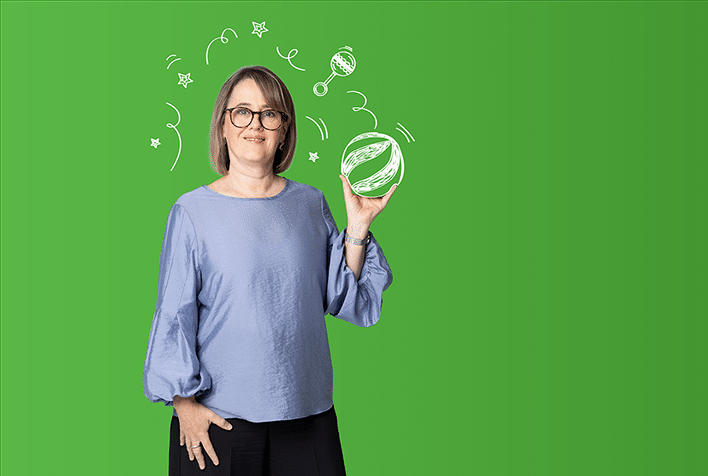
What excites Cathy the most about her work is the momentum for early diagnosis and early intervention on a global scale, to improve opportunities and outcomes for kids born with CP no matter where they live. When diagnosed early, early intervention can support kids to do things that defy medical odds – like walking, kicking soccer balls and riding skateboards.
The biggest advancement in research that Cathy has seen during her 20 years at CPA is the decline in the incidence and severity of cerebral palsy – a result that has come from a lot of great minds working together.
“We are moving the dial down from diagnosis at an average age of 17 months to well below 12 months and as young as 3 months sometimes. We have really driven the movement away from a “wait and see” attitude to let’s get this child and family all the support they need as early as possible.
We know that the first 1-2000 days are critical and we don’t want to waste a single day.”
Fundamentally CPA Research is focused on answering research questions that we’ve been told by people with CP and their families is important to them. The programs are organised around what matters to people with CP. And this is the point we can keep coming back to, when the pathway is a bit unclear.
“We have a common purpose and that’s what drives us. We want to prevent CP, understand more about what causes CP, work towards a cure and find the best treatments and technologies to assist people with CP to live the lives they want to live.”
Within CPA Research there are multiple opportunities to work synergistically to design rigorous studies that are aligned with the priorities of our clients, and their families and carers.
Research fundamentally guides the way that CPA operates as an organisation. There’s a genuine commitment to use research evidence extending from therapy services to fundraising are genuinely interested in how new research findings should impact what we do.
“The fundraising team work hard to find philanthropic funding that matches the work we are doing; the communications team support translation of sometimes complex material into easy-to-understand formats; therapy services help us recruit; equipment services customise a variety of aides and equipment to support our intervention. We could not do what we do without this commitment to working together for our common cause and vision.”
Cathy’s perspective on how CPA think differently is when we’ve been told something can’t be done, a door opens for us to ask more questions and to find a work around to get the outcome that clients need. This is how we got the Early Diagnosis clinic up and going in the end – the pathway we thought would work didn’t and we had to think differently, and now we are soon to open a third clinic. And the feedback from parents and referrers is overwhelmingly positive.
When Cathy and the Research team started the early intervention research about 10 years ago, they conducted a survey and found that babies with brain injuries were on average getting 14 hours of therapy a year. That’s the same amount as an adult who had a stroke might get in a fortnight. Kids who have been enrolled in our research program have had about 45 hours in the first year.
This means early intervention can be customised to each child and parents can be supported with cutting edge information. Families tell us that their children are often exceeding their expectations and they feel so relieved.
This is the magic that can happen when
Great minds think differently!